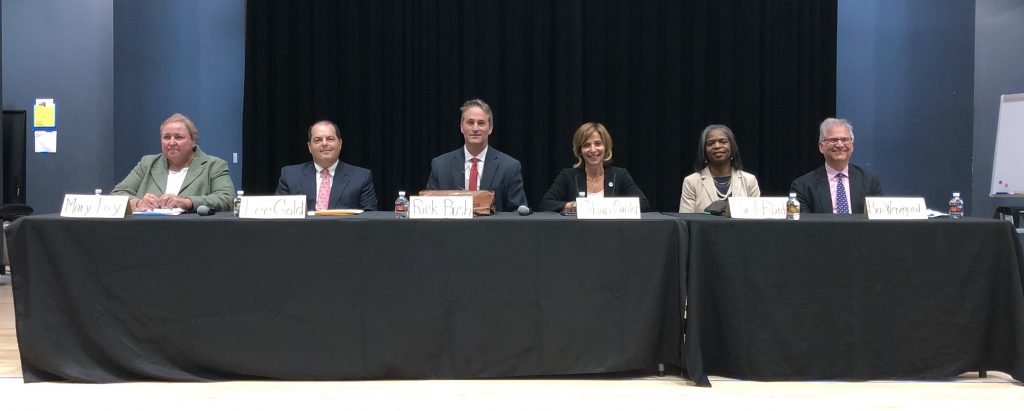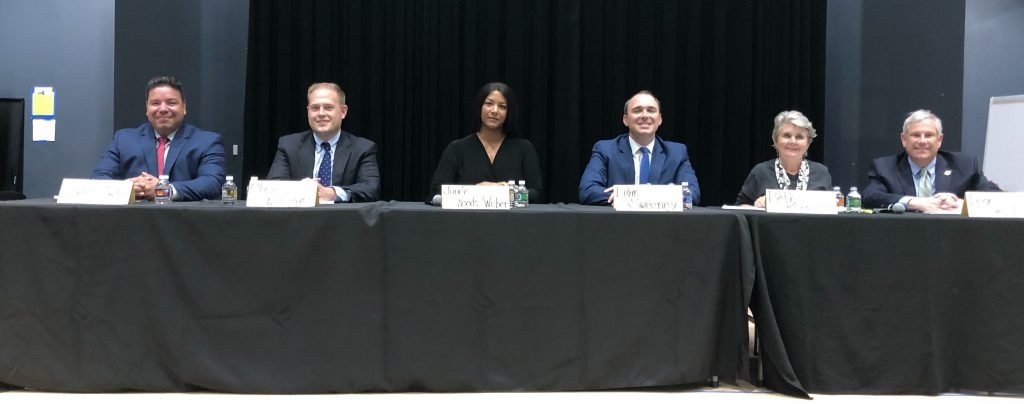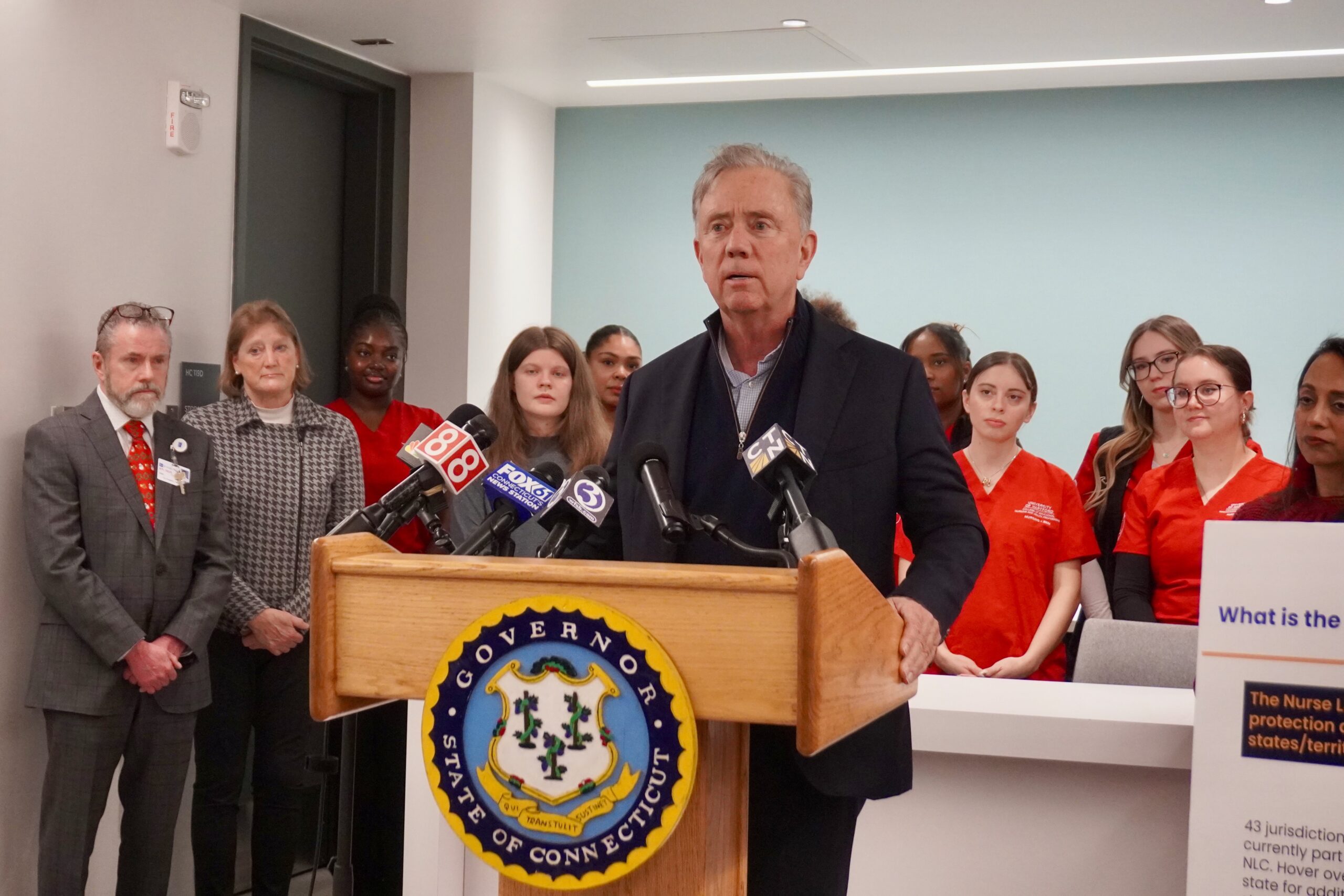West Hartford Town Council Candidates Square Off at League of Women Voters Debate

Audio By Carbonatix

Debate no. 1 (top row) included (from left); Mary Fay, Lee Gold, Rick Bush, Shari Cantor, Carol Blanks, and Ben Wenograd. Debate no. 2 (bottom row) featured (from left): Al Cortes, Chris Williams, Janee Woods-Weber, Liam Sweeney, Beth Kerrigan, and Ben Wenograd. Photo credit: Ronni Newton
West Hartford Town Council candidates, split into two groups, debated Thursday night at Charter Oak International Academy.
By Ronni Newton
Twelve Town Council candidates, in two separate debates, responded to a series of questions Thursday night at Charter Oak International Academy, with Democrats defending their record of supporting the town’s diversity and quality of life, Republicans turning nearly every question into a commentary on the budget, and a third-party candidate looking to differentiate herself.
Approximately 70 people were in the audience for the debates, both of which were moderated by Carole Mulready, chair of voter services for the League of Women Voters of Greater Hartford (LWVGH). In the cumulative time format, each candidate was provided 8 minutes to speak, including rebuttal time, plus a 2-minute closing statement.
Some of the questions were prepared by LWVGH, while others were submitted by audience members. Questions varied between the two sessions.
Debate No. 1

Town Council debate session no. 1, Oct. 10, 2019. Photo credit: Ronni Newton
Debate pairings were determined in advance to have a balance of veteran Council members and new candidates, as well as by party and gender. The first debate session featured (pictured above, from left): incumbent Republican Mary Fay, Republican Lee Gold Republican Rick Bush, Mayor (Democrat) Shari Cantor, Democrat Carol Blanks, and incumbent Democrat Ben Wenograd.
The first question posed to the group requested their position on establishing a policy for affordable housing in West Hartford.
Fay, first in the response order, noted that she was really pleased that the Council just unanimously approved the proposal to redevelop West Hartford Fellowship Housing and expand the number of units of affordable housing. “But the biggest thing we can do is stem tax increases,” she said, stating that seniors are leaving town and houses are not appreciating. Fay said the Council needs to “address the people who are already here and lower their property taxes.”
Gold, who is running for office for the first time, said, “Affordable housing is a staple of our town, something that is very important and dear to me,” but like Fay added that what’s needed is addressing the budget so people on fixed income can afford to stay on town.
Cantor said that currently West Hartford has 7 percent of its housing stock qualifying as affordable, and the West Hartford Housing Authority is the designated agency for affordable housing. She said that the quantity of affordable housing is reviewed periodically, “and there is definitely more we can do.”
Bush, a first-time candidate, is a landlord and property manager, and said the town, through the West Hartford Housing Authority, has done a great job. Taxes, as well as out-of-control water bills, lead to rent increases for lower income people, he said. “Maintaining affordable housing needs to be a concerted effort,” Bush said.
Blanks, currently chair of the Board of Education and a first-time Town Council candidate, said that what the Council has been doing regarding affordable housing is good, but she would look to expand on it. “I think much more needs to be done,” Blanks said. She would love to see more projects like the moderately-priced condominiums currently under construction on Ringgold Street, so that, for example, great teachers who are attracted to work in West Hartford can afford to live in town. “Let’s continue to do that, but let’s do that with a wider lens,” said Blanks, to attract people of all types, including seniors.
Wenograd said he is gratified to hear everyone supporting affordable housing in town, because in the past proposed developments have sparked controversy and opposition. He noted that for the first time the Town Council put into place an affordability incentive in a zoning density ordinance passed recently. “There’s more we can do,” Wenograd said, adding that he is particularly excited about current and future development near the busway on New Park, and cautioned that while growth, and an increased stock of apartments is important, we need to “make sure we don’t endanger the affordable housing that we do have … not have tear downs and gentrification.”
A question regarding development of the former UConn campus had been developed by the LWVGH, but had to be modified because the town’s corporation counsel said Council members, as the zoning authority, cannot directly address that issue. The revised question asked candidates to comment on what can be done to allow new development applications to be handled swiftly and legally.
All responses included support for increasing the town’s grand list, which will help decrease the reliance on residential property taxes.
Without specifically referring to the former UConn parcel, Gold said that developing certain properties can help attract jobs, innovation, venture capitalists, and start-ups. Development in all parts of town needs to be considered, he said.
Cantor noted that occupancy rates in West Hartford are high, with vibrant commercial centers, but 89 percent of the town’s revenue comes from property taxes, and 72 percent of that from residential property. The major problem is that there isn’t land. “Redevelopment will help turn over some aging properties,” she said, adding that while there is more to do, zoning changes, particularly in the New Park Avenue area, are already and will continue to allow for that.
“West Hartford is a leader in Connecticut. We’re one of the most robust towns,” Bush said, noting that when he moved here there was only about one restaurant in the Center. “We should definitely incentivize development, maybe with tax breaks,” he added.
Blanks said the New Park Corridor is a “prime area for redevelopment,” where more opportunities can be created for people to walk or bike to work. “This is a prime time to capitalize on vacant spaces around town,” she said, and also attract businesses that can partner with the town’s schools.
“One thing we have to realize is that our West Hartford is the economic engine of the entire region,” Wenograd said. He said we need to retain existing businesses and attract more, adding that he is not a big fan of tax breaks and the town has done a good job attracting businesses with doing that. West Hartford is one of only 10 towns in the state that have retained property values since 2007, he said. “We are doing the right stuff.”
“Not surprisingly I see things a little bit differently,” said Fay. “You have to leap over that huge hurdle called Connecticut.” Because there is limited space there needs to be redevelopment, and the grand list needs to stop being “anemic,” she said, and start “growing exponentially.”
A question about fixing “the broken infrastructure of the town’s roads” was posed, with a second portion about noise ordinances to address motorcycles and cars with defective mufflers.
“West Hartford has always invested in our infrastructure,” Cantor said. As a triple-A rated community, the town is able to borrow at a favorable rate, she said. “We are committed to our infrastructure and we invest in about 7 miles of road a year,” she said, but what makes certain road projects complicated is the need to coordinate work with the MDC and other utility companies.
Cantor said noise, which would be a health department issue, doesn’t seem to be a problem, but speeding is – and is something the police continue to address. New technology, like the “happy faces” that appear when you are going the correct speed, are helping.
Bush said the roads certainly have some issues, but wore importantly what needs to be fixed is “what’s going on under the roads – the sewer system.” He said he will “work very hard” to come up with a coordinated approach.
Blanks agreed that fixing roadways requires a partnership, but one problem is that as soon as roads are fixed material to de-ice needs to be put down,
Wenograd said it’s a balance: “How much can we spend on roads while keeping taxes as low as possible?” Granite curbs – which many people complain about, especially when they pop tires which Wenograd said happened to him recently – not only last a long time but hold the road together. “It may seem like an extravagance but it’s good fiscal policy.”
“One of the top complaints I get in emails or by phone is the condition of the roads,” Fay said. Paving only 7 miles is about half of what was done years ago, she said, and it’s a “matter of priorities.” In the town budget, she said she doesn’t think benefits should be half of salaries.
Gold also noted the need to prioritize, and the 29 percent of town roadways rated as poor “need to be addressed,” and the process of repaving needs to be speeded up.
Another question considered climate change, and raiding of a $50 million fund to support energy affordability.
Bush said the town already has done quite a bit to conserve and achieve self sufficiency, and said there is funding available through many sources to assist low income people with energy costs.
“This is a very important issue we all must face,” Blanks said. While the town has already cut energy costs by about 18 percent, there is more that can be done, and even lessons to be learned about recycling from elementary school students who embrace it. “I think it’s up to all of us to initiate and introduce various projects to save our earth.”
“Climate change is real,” Wenograd said, and it’s “a moral imperative that we do everything we can to address it.” Transit-oriented development, encouraging people to walk or bike more, isn’t even enough and we need to keep going, he said.
Fay said everyone is concerned about the environment, but regarding energy, “the United States has never been better positioned than we are now.” We need to be careful that we don’t penalize people, she said.
“Climate change, the planet – it’s where we live. We can’t just move and go to Mars,” said Gold. He said the town has done important work to help the environment, but if we consider expanding the use of solar energy, adding panels to roofs or putting them in parks could change the look of the town. He said he thinks residents, not just the Council, should make that decision.
Cantor said West Hartford was one of the first towns to hire a part-time energy specialist – and that helped reduce energy use by 20 percent. She noted that the Charter Oak International Academy building, where the debate was taking place, is geothermal, there are 12 solar sites, and almost all street lights are LED. Right now West Hartford has achieved Sustainable CT’s bronze status, and a new opportunity for nonprofits to apply for grants to achieve energy savings has been launched, she said.
Wenograd addressed a rebuttal to Fay’s comments, emphatically stating, “I do need to repeat – the science is absolutely clear. … Climate change caused by humans is real and dangerous.”
Fay commented, “There is science that says it’s not all human,” and added that all points of view should be respected.
Candidates were asked how they would reach out to the multicultural community, particularly at Charter Oak, where 40 percent of students are Latino or from other countries.
All praised the town’s diversity.
The town has just completed an independent study of its fire department, and candidates were asked if they supported its findings.
“What it suggested is current staffing levels are appropriate,” Wenograd said, adding that we have a fantastic fire department and any cuts would yield decreases in public safety.
Fay said that public safety is “probably the second-most important thing for any town next to education,” but added that the study found some things that could be done better. There is a need to address fixed costs, she said, noting that 90 percent of calls come from three of the fire houses.
Gold said it’s important to have “a vibrant public safety department,” but the town should consider if the town needs the current number of fire houses.
Cantor said the study, which was initiated by the Council for the first time, “actually taught us a lot.” Public safety is actually the number one concern for a community, she said, and noted that the recently launched paramedic program saved the town $402,000 in the first year, $900,000 last year, and $650,000 in the current year.
Bush said while he hasn’t had a chance to read the study yet, the service is fantastic, noting that his mother-in-law’s life was saved when she went into heart failure. “I certainly would not want to diminish the quality of what we have.”
Blanks said she believes the fire department is the right size.
Each candidate was given the opportunity for a final statement, which most used to ask for the support of voters as well to make points in addition to the question that were asked.
“We can’t rest on our laurels,” said Fay, adding that’s she’s concerned “West Hartford is at a tipping point.”
“Local elections matter,” said Cantor. “When you cast your ballot you are voting for the candidates who have a direct impact on your life.” She highlighted that West Hartford is a top-ranked town, its centers are thriving, and 90 new businesses have opened in the past 12 months.
Debate No. 2

Town Council debate session no. 2, Oct. 10, 2019. Photo credit: Ronni Newton
Debate session no. 2 featured (pictured above, from left) Republican Al Cortes, incumbent Republican Chris Williams, Working Families Party candidate Janée Woods-Weber, incumbent Democrat Liam Sweeney, Deputy Mayor (Democrat) Beth Kerrigan, and incumbent Democrat Leon Davidoff.
Their first question, nearly identical to one from the first session, was about willingness to support West Hartford becoming an energy-sufficient community, and if so, by what means and by what date.
“We’re having budget issues, we have to keep within our means,” Cortes said. Energy sufficiency is not a priority, and the town needs to look at how to be more efficient spending our money and the state’s money, he said.
“I think it’s important to be environmentally conscious … but what I am really concerned about is sustainability about things we control. That’s the budget,” Williams said.
Woods-Weber said she supports “increasing energy efficiency as quickly as possible.” While a community choice aggregation bill failed to pass the legislature, “that’s the kind of exciting direction we need to be moving in,” she said, adding that she would also like to see more electric car charing stations in town.
Sweeney noted his role as chairman of the Council’s Administration and Technology Committee – one of the best nonpartisan committees. He said two recent initiatives – hiring an energy specialist which has reduced usage by 20 percent, and moving documents to a paperless agenda – have already made a difference. Solar panels have been are continuing to be installed on flat roofs of schools, and the town is a leader in this area, he said.
Kerrigan noted the statistics cited by Cantor in the first debate. “We are a community that knows the importance of protecting our environment,” she said.
“We owe our children and our grandchildren a better world,” said Davidoff, and elected officials need to be held to a high standard. There are many ways to be green, he said, adding, “When we adopt a green policy, guess what, we save the green and that’s your tax dollars.”
Candidates were asked what they would do to combat racism and discrimination in West Hartford, so those who are considered “other” have the same opportunities.
While all six agreed diversity is important, the Republican candidates also used the question to comment on the budget.
Williams said West Hartford is a “microcosm of America … preserving that has always been one of my goals.” He said he’s concerned that balance will be hurt by the majority party because the town is less affordable, noting that tenants also pay taxes. “If we want to be a diverse community we have got to get control over the budget,” he said.
Woods-Weber said that helping communities deal with issues of diversity and inclusiveness is what she has built her career on. She said she brings diversity representation to the table, and favors not only diversity but inclusivity “where everyone has an opportunity to thrive.”
Sweeney said there are four major things the town can do better: continue to support a program increasing recruitment of teachers of color, focus on affordable housing, and make sure West Hartford’s public safety officers continue to ensure the town is welcoming to all. The recent hiring of Police Chief Vernon Riddick, who is black, is a huge step because “kids of color need to see teachers and police that look like them.” The fourth thing is support of the Bridge’s teen center, Sweeney said, a place he grew up attending.
“This is a topic that’s near and dear to my heart,” said Kerrigan, noting the support in town that she and her wife, Jody, received when they moved to West Hartford. “Our kids are brown,” she said. “Jody and I chose West Hartford because they do accept people of all kinds.”
“Racism and discrimination have no place in West Hartford and no place in America,” said Davidoff.
Cortes said the question wasn’t broad enough. “What I like about West Hartford is there are people who look like me, but on my street there are not … they are in affordable housing.” He said it’s important to be inclusive, but also to look at financial diversity.
In response to a question about the arrests of teens of color, there was some uncertainty about the accuracy of the statistic cited, but all candidates noted the importance of eduction and training for police officers to avoid racial profiling, and the need for youth programs.
A question was asked about ensuring that all teachers receive training in cultural competency, and while the question acknowledged that it is not the Council’s job to make policy for the Board of Education, candidates were asked how the would enforce state requirements.
The Democrats noted the open lines of communication between the Board of Education, law enforcement, and other town officials.
Williams answered that he would reach out to the Board of Education, but “the most difficult question the Town Council faces is what to do about its budget. The majority party has no answers. They love this debate because there has been no question about the budget,” he said. “They were too concerned with getting titles in magazines,” Williams said, noting that he has brought up looking at the fire department because there are less fires and “it’s reasonable to look at reducing the size of the fire department … We can spend time looking at the diversity issue but that’s not the biggest issue for our town right now.”
Woods-Weber said that while the town can’t set policy for the Board of Education, it can set the example and commit to cultural competency itself to set the expectation.
Kerrigan rebutted Williams’ comments on the budget. “I do think it might be a tad disingenuous to say the majority party just wants to raise taxes. Every year the Council as a whole sits down and goes through every single line item,” she said, noting that 1 mill is equivalent to $6.5 million in the budget.
The next question was actually about the budget, and candidates were asked what services they would reduce to lower taxes, and what the Council should do rather than cutting emergency services.
Kerrigan said she would want to ask the community what they are willing to give up, because it impacts everyone. The town’s per pupil spending is already one of the lowest in the state, and she said she thinks the focus needs to be on increasing revenue.
Davidoff said it’s a “glass half full or half empty” question. “I first seek what efficiencies we can make in the services we deliver to our citizens,” he said, and how, as a councilor, economic development can be encouraged to increase the grand list. As for the Fitch study of the fire department, he said the results are still being examined. “We need to do our homework, need to review the report, need to have a dialogue at the Council table … then we come to reasonable commonsense solutions, not just knee-jerk response.”
Cortes said it’s been higher taxes and reduced services, noting the loss of leaf pick-up and weekly recycling. School enrollment is down, but the town still has a third middle school, he said. “Let’s address the waste issue first … we have a bigger issue, when are we going to lose the state funding?” He said while the fire department’s response was amazing when his son had a seizure, “let firefighters fight fires.”
Williams said the responses from the Democrats were “zero, bupkis.” The town “just spent $72,000 to buy an ambulance bed for a service we don’t have,” he said. [This reference is to surplus recently allocated for the purchase of a hydraulic lift. An earlier version of this article incorrectly indicated that the reference was regarding purchase of an intercept vehicle.] “Talk about knee-jerk reactions, we’re buying equipment for service we don’t have.”
Woods-Weber said while the “Republicans and Democrats duke it out over this question,” as a member of the Working Families Party she has a different perspective. “Taxes represent the collective investment we are willing to make,” she said, and cuts should not be made “without a really solid community discussion.” She said it’s important to work with our state delegation to shift the view statewide that the community is more affluent than it really is. She also suggested getting more police officers out of their cruisers and onto bikes.
Sweeney said he disagrees that the Democrats have not provided cuts, noting the switch to a paperless system. The move to biweekly recycling came with an additional service of yard waste pickup, he said, that has led to a significant reduction in tipping fees. “We are coming up with ideas and trying to be creating as well.”
As in the first debate, candidates had the chance to make a final statement.
Both Republicans spoke about the need for budget control, and Woods-Weber said as the town’s first Working Families Party candidate, she brings a “fresh eye.”
Kerrigan said that the community cares, and without that engagement West Hartford would not be the desirable town that it is. She also noted that the Fitch study concluded that we need the current number of firefighters, and using them to provide paramedic services also brings in revenue.
Both debate sessions will be aired in their entirety several times prior to the Nov. 5 election on West Hartford Community Interactive (Comcast Channel 5) beginning Oct. 16 at 7:30 p.m. Click here to view the schedule. They will also be available on the WHCi YouTube channel.
Like what you see here? Click here to subscribe to We-Ha’s newsletter so you’ll always be in the know about what’s happening in West Hartford!




[…] and sweet potato fries without any guilt), and even though I spent most of Sunday working on the story about last week’s debate and this column, it was a great […]
Kudos, Ronnie, for capturing the full extent of the debate for Council!!!!
Excellent service to voters.
Thank you